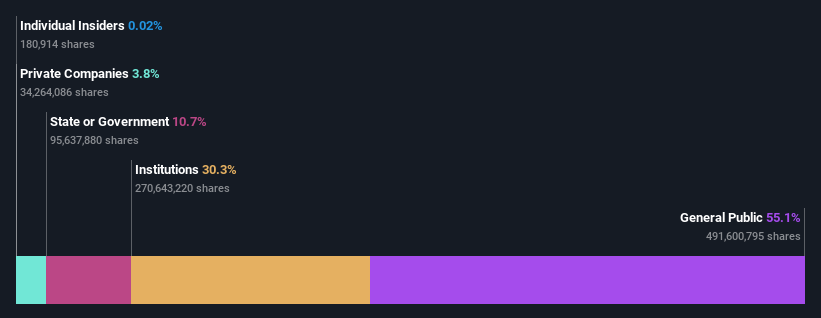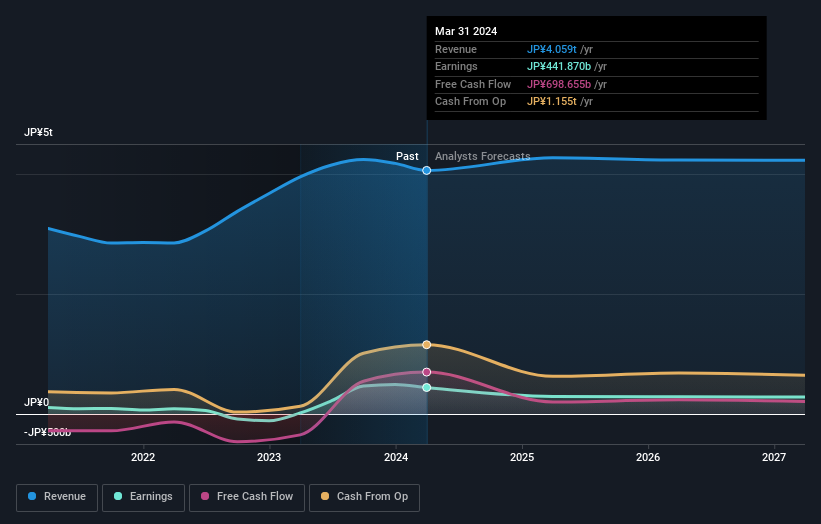Stock Analysis
- Japan
- /
- Electric Utilities
- /
- TSE:9503
Individual investors who hold 55% of The Kansai Electric Power Company, Incorporated (TSE:9503) gained 3.2%, institutions profited as well

Key Insights
- Significant control over Kansai Electric Power Company by individual investors implies that the general public has more power to influence management and governance-related decisions
- The top 25 shareholders own 42% of the company
- Institutions own 30% of Kansai Electric Power Company
A look at the shareholders of The Kansai Electric Power Company, Incorporated (TSE:9503) can tell us which group is most powerful. And the group that holds the biggest piece of the pie are individual investors with 55% ownership. That is, the group stands to benefit the most if the stock rises (or lose the most if there is a downturn).
While individual investors were the group that benefitted the most from last week’s JP¥78b market cap gain, institutions too had a 30% share in those profits.
In the chart below, we zoom in on the different ownership groups of Kansai Electric Power Company.
View our latest analysis for Kansai Electric Power Company

What Does The Institutional Ownership Tell Us About Kansai Electric Power Company?
Institutional investors commonly compare their own returns to the returns of a commonly followed index. So they generally do consider buying larger companies that are included in the relevant benchmark index.
We can see that Kansai Electric Power Company does have institutional investors; and they hold a good portion of the company's stock. This implies the analysts working for those institutions have looked at the stock and they like it. But just like anyone else, they could be wrong. If multiple institutions change their view on a stock at the same time, you could see the share price drop fast. It's therefore worth looking at Kansai Electric Power Company's earnings history below. Of course, the future is what really matters.

Kansai Electric Power Company is not owned by hedge funds. The company's largest shareholder is City of Osaka, with ownership of 7.7%. In comparison, the second and third largest shareholders hold about 5.3% and 3.1% of the stock.
On studying our ownership data, we found that 25 of the top shareholders collectively own less than 50% of the share register, implying that no single individual has a majority interest.
While it makes sense to study institutional ownership data for a company, it also makes sense to study analyst sentiments to know which way the wind is blowing. There are a reasonable number of analysts covering the stock, so it might be useful to find out their aggregate view on the future.
Insider Ownership Of Kansai Electric Power Company
While the precise definition of an insider can be subjective, almost everyone considers board members to be insiders. Company management run the business, but the CEO will answer to the board, even if he or she is a member of it.
I generally consider insider ownership to be a good thing. However, on some occasions it makes it more difficult for other shareholders to hold the board accountable for decisions.
Our data suggests that insiders own under 1% of The Kansai Electric Power Company, Incorporated in their own names. But they may have an indirect interest through a corporate structure that we haven't picked up on. Being so large, we would not expect insiders to own a large proportion of the stock. Collectively, they own JP¥501m of stock. It is always good to see at least some insider ownership, but it might be worth checking if those insiders have been selling.
General Public Ownership
The general public, mostly comprising of individual investors, collectively holds 55% of Kansai Electric Power Company shares. This size of ownership gives investors from the general public some collective power. They can and probably do influence decisions on executive compensation, dividend policies and proposed business acquisitions.
Private Company Ownership
We can see that Private Companies own 3.8%, of the shares on issue. It might be worth looking deeper into this. If related parties, such as insiders, have an interest in one of these private companies, that should be disclosed in the annual report. Private companies may also have a strategic interest in the company.
Next Steps:
It's always worth thinking about the different groups who own shares in a company. But to understand Kansai Electric Power Company better, we need to consider many other factors. Case in point: We've spotted 3 warning signs for Kansai Electric Power Company you should be aware of, and 1 of them can't be ignored.
Ultimately the future is most important. You can access this free report on analyst forecasts for the company.
NB: Figures in this article are calculated using data from the last twelve months, which refer to the 12-month period ending on the last date of the month the financial statement is dated. This may not be consistent with full year annual report figures.
Valuation is complex, but we're helping make it simple.
Find out whether Kansai Electric Power Company is potentially over or undervalued by checking out our comprehensive analysis, which includes fair value estimates, risks and warnings, dividends, insider transactions and financial health.
View the Free AnalysisHave feedback on this article? Concerned about the content? Get in touch with us directly. Alternatively, email editorial-team (at) simplywallst.com.
This article by Simply Wall St is general in nature. We provide commentary based on historical data and analyst forecasts only using an unbiased methodology and our articles are not intended to be financial advice. It does not constitute a recommendation to buy or sell any stock, and does not take account of your objectives, or your financial situation. We aim to bring you long-term focused analysis driven by fundamental data. Note that our analysis may not factor in the latest price-sensitive company announcements or qualitative material. Simply Wall St has no position in any stocks mentioned.
Valuation is complex, but we're helping make it simple.
Find out whether Kansai Electric Power Company is potentially over or undervalued by checking out our comprehensive analysis, which includes fair value estimates, risks and warnings, dividends, insider transactions and financial health.
View the Free AnalysisHave feedback on this article? Concerned about the content? Get in touch with us directly. Alternatively, email editorial-team@simplywallst.com
About TSE:9503
Kansai Electric Power Company
Engages in electricity, gas and heat supply, and telecommunication businesses in Japan.
Solid track record and good value.

